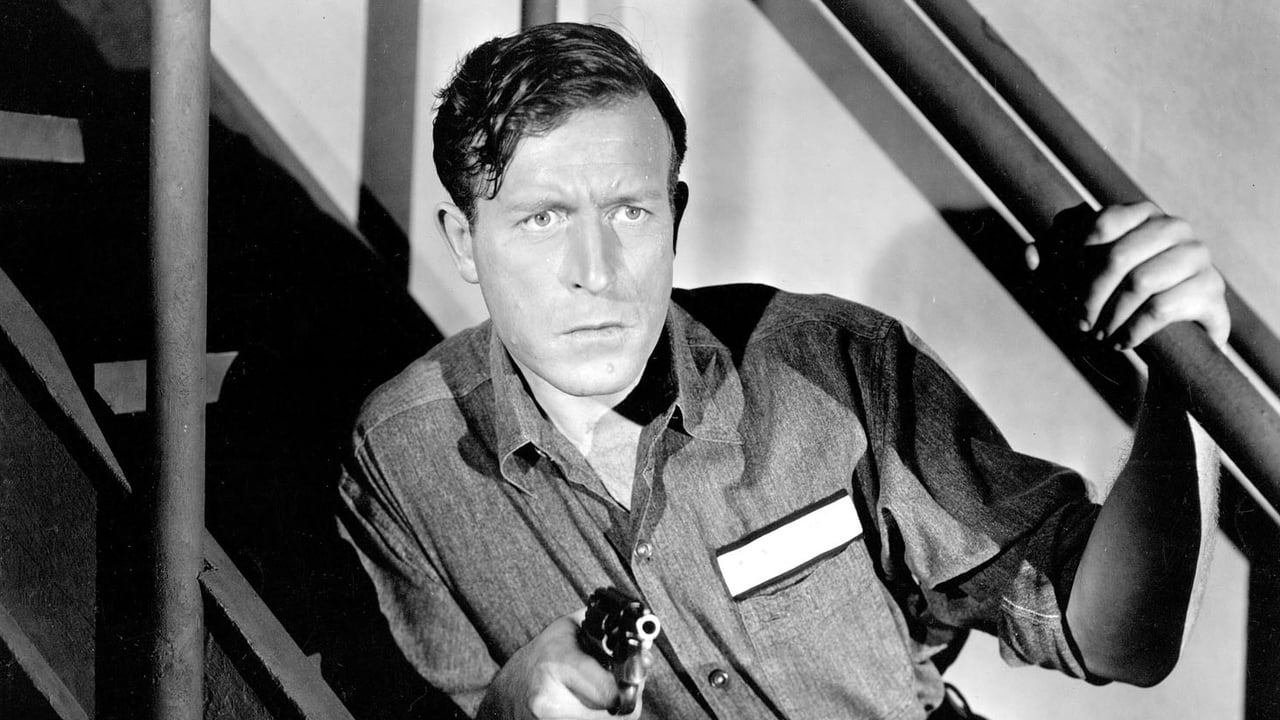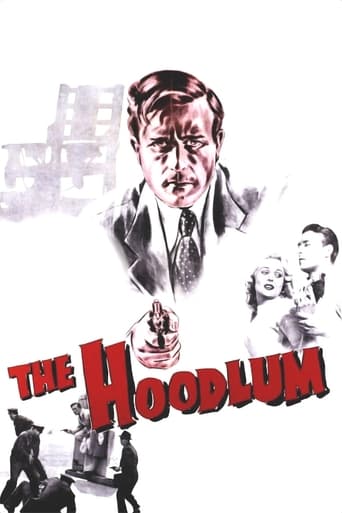

"Dillinger" director Max Nosseck's "The Hoodlum" qualifies as a good, gritty, heist caper with a crime doesn't pay theme. The hero—or perhaps I should write-anti-hero is a career criminal who has spent more time behind bars than in front of them. Lawrence Tierney plays Vincent Lubeck, and Lubeck ranks as a first-class louse. He started stealing early in life and couldn't shake the habit. He steals his own brother's girlfriend and takes advantage of his relationship with a female bank employee to orchestrate a complicated heist. The heist itself generate suspense. "The Hoodlum" amounts not only to a character study about an unrepentant protagonist doomed to die, but it also deals with a heist involving an armored car robbery. Nosseck creates palatable suspense in several scenes, especially during the roadblock of the funeral procession and later when Vincent swipes a police cruiser right out from under the police. This is a compact, tightly made bit of film noir in the sense that the protagonist is a product of a flawed justice system that endeavors to rehabilitate an individual. Despite its low-budget, "The Hoodlum" succeeds brilliantly because Tierney delivers a pugnacious performance. The armored car robbery that our protagonist and several henchmen carry out turns into a spectacular shoot-out. Lean and mean at 62 minutes, "The Hoodlum" never wears out its welcome.
... View MoreAfter five years in the jug, a hard-bitten criminal is reluctantly freed by the skeptical parole board, largely on the pleas of his elderly mother; in no time flat, the hood--now pumping gas at a service station owned by his brother--is plotting the robbery of an armored car along with his cronies. Reunited from the low-budget, critically-acclaimed 1945 gangster film "Dillinger", director Max Nosseck and actor Lawrence Tierney are unable to make lightning strike twice. There are some amusingly rough and tough moments but, curiously, this effort is even more cheaply made than the duo's last (and it only runs an hour!). Opening with a brief flash of the epilogue, the flatfooted narrative then precedes to the jailhouse with some ridiculously melodramatic overacting. Tierney is a solidly unsentimental anti-hero, quick-tempered and rotten to the core, yet he connects with the audience instantly. He might have become a star on the level of Cagney or Bogart had the proper vehicles come his way. This one is just a time-waster, though the logistics of a complicated robbery provide minor interest. ** from ****
... View MoreNever viewed this 1951 film starring Lawrence Tierney,(Vincent Lubeck) who is up for parole from prison, however, the warden does not want to release him because he almost knows he is evil through and through. Mrs. Lubeck,(Lisa Golm) walks into the parole board meeting and pleads for her sons release and it is finally granted. Vincent spent five years in prison and is worse than when he went into the prison. Johnny Lubeck, (Edward Tierney) greets his brother back and offers him a job at his gas station to work and get himself on the right side of the law. It is not long before Vincent steals his brothers girl friend and then decides to pull off a big job across the street from his brothers gas station. If you viewed the film "Dillinger" in 1945, Tierney plays almost the same role with plenty of hate for everybody and a mean look on his face all the time. In this film, Lawrence Tierneys brother, Edward Tierney gave a great supporting role. Lisa Golm, (Mrs. Lubeck) gave a great portrayal of Vincent Lubeck's mother and acted just like a loving mother would towards her wayward son. Enjoy
... View MoreThe Hoodlum (1951)In this sequel to Nosseck's remarkable Dillinger (1945), real life tough guy Lawrence Tierney reprises his role of a scowling, unredeemable thug (he also appeared in the same director's equally hardboiled Kill or Be Killed (1950). The result is another tight and tough little film, if not quite on the same level. The main reason for this is a plot that's less convincing than Yordan's was back in 1945 when the real Dillinger's famously dramatic life provided excellent inspiration. Yordan, who went on to script such projects as El Cid, was plainly more of an artist than Neumann and Tanchuk, providing the story here. Events are more predictable the anti-hero is even provided with a sentimental death bed scene to weep his belated crocodile tears. Fortunately Tierney plays this final pay off with little sentimentality, even hiding his face rather than letting the audience see him weaken'. As Lubeck, the hoodlum just out from jail finding life too dull working in his brother's pump station, Tierney is once again excellent, up to and including the inevitable denouement. His determined unrepentance creates a thrusting charisma which both Rosa (his brother's girl, whom he briefly seduces, impregnates and discards), the bank manager's secretary and the audience find hard to ignore. As an actor Tierney can manage a cruel arrogance even when working a petrol pump, while Lubeck's cynical disassocation from his family makes him seem a very modern.Interestingly, almost half the running time of the film has elapsed before he commits his first crime, or even fires a shot. For the rest of the time the hoodlum is brooding, contemplating the raw deal he has been handed, feeling as imprisoned by his humdrum job as no doubt millions of others did (and do) at the time. The difference is that he wants to reach for his big break in dramatic and violent fashion as he has it `all figured out now'. Its the heist he has planned, with the desperate aftermath, occupies the remainder of the film.Ironically it is Lubeck's mother whose tears soften the heat of his parole board, thereby releasing her vicious son back into circulation. By the end, along with society, she inevitably regrets this decision, but her role in obtaining his release means that, in some respect at least, she is responsible for the anti-social acts he performs. In this light her final scene can be seen as much an act of necessary repentence as it is her reconciliation with reality.The Hoodlum also boasts a minor first in that Tierney's real life brother Edward appears on screen for the first time, playing Vince's nice-but-dull brother. Despite all his good intentions, he ends up holding a gun on his sibling before literally driving him to his death - an event the significance of which frames the main action of the film in flashback, a typical noir conceit. Edward has little of Lawrence's screen presence, although here the novelty of the casting (which recalls the on-screen partnership of the Mitchum brothers in the cult film Thunder Road (1958 )) makes up for some his gaucheness.Nosseck's muscular, ever hard to see films are overdue for reassessment. His three with Tierney are generally excellent, although hampered by constraints of budget and length. Also recommended is his British black out thriller The Brighton Strangler, more atmospheric than one might expect, and directed in the same vintage year as Dillinger.
... View More